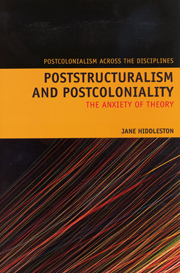Book contents
- Frontmatter
- Contents
- Acknowledgements
- Introduction
- Part One Poststructuralism in Algeria
- Part Two Theory and Cultural Difference
- 4 Displacing Barthes: Self, Other and the Theorist's Uneasy Belonging
- 5 National Identity and Etrangeté: Kristeva's Search for a Language of Otherness
- 6 Spivak's Echo: Autobiography, Narcissism and the Theoretical Voice
- Conclusion
- Bibliography
- Index
4 - Displacing Barthes: Self, Other and the Theorist's Uneasy Belonging
from Part Two - Theory and Cultural Difference
- Frontmatter
- Contents
- Acknowledgements
- Introduction
- Part One Poststructuralism in Algeria
- Part Two Theory and Cultural Difference
- 4 Displacing Barthes: Self, Other and the Theorist's Uneasy Belonging
- 5 National Identity and Etrangeté: Kristeva's Search for a Language of Otherness
- 6 Spivak's Echo: Autobiography, Narcissism and the Theoretical Voice
- Conclusion
- Bibliography
- Index
Summary
Roland Barthes nowhere writes specifically about postcoloniality, and yet much of his work is concerned both with cultural otherness and with the identity and belonging of the self in a postcolonial period of migration and intercultural exchange. Derrida, Cixous and Lyotard all write directly, though in different ways, about colonial and postcolonial Algeria, but Barthes's reflections on alterity are much less clearly related to the politics of the French colonial project and its aftermath. Barthes lacks the sense of postcolonial antagonism present in the work of the thinkers discussed so far, and he explores travel and encounter from a cultural and linguistic point of view while paying little attention to history or politics. Nevertheless, it is revealing that Barthes's musings on cultural difference also betray, like the work of Derrida and Cixous, a self-conscious preoccupation with the inscription of the self into theoretical discourse. Writing after the collapse of the French Empire and reflecting on the uneasy relation between Frenchness and cultural otherness during this period, Barthes displays an anxiety concerning his persona's interaction with different cultures that echoes, without explicitly evoking, the postcolonial uncertainty discussed so far in this study. His writing explores the theorist's encounter with the exotic, which, though not always postcolonial, can shed light on the danger of exoticisation that also plagues the postcolonial theorist's contemplation of the other.
- Type
- Chapter
- Information
- Poststructuralism and PostcolonialityThe Anxiety of Theory, pp. 99 - 124Publisher: Liverpool University PressPrint publication year: 2010
- 1
- Cited by



